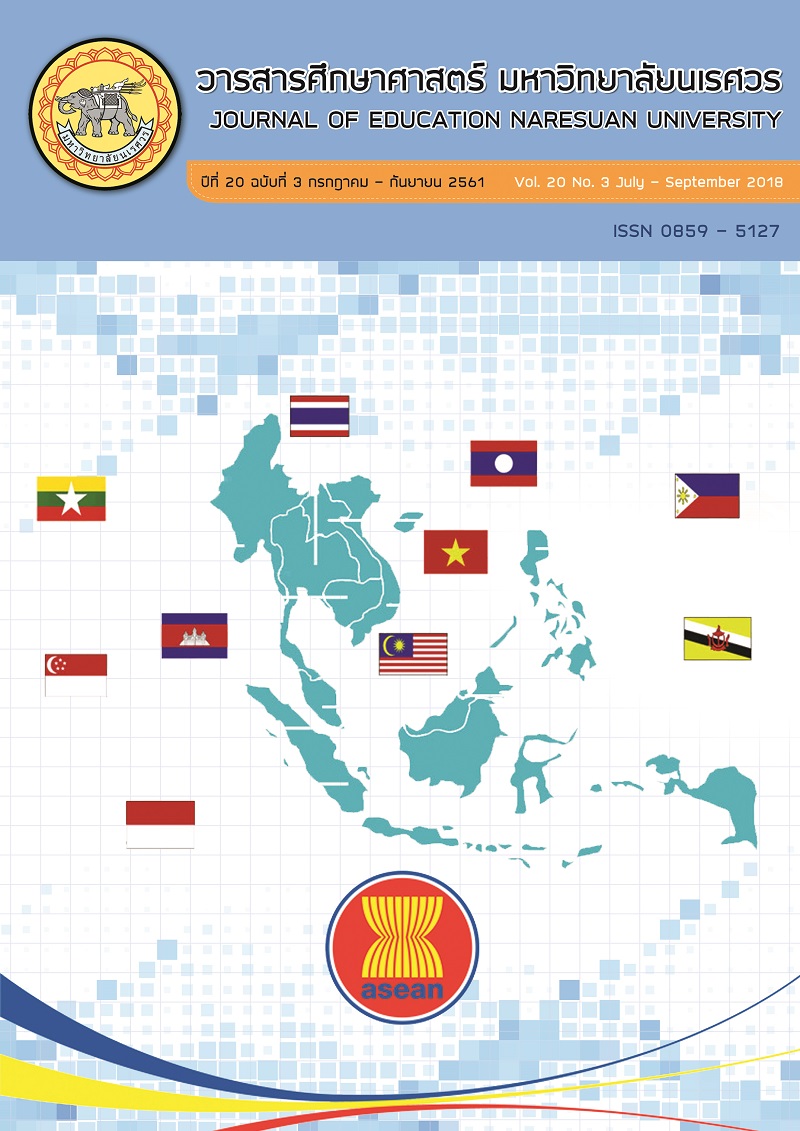รูปแบบการบริหารเพื่อพัฒนาคุณลักษณะอันพึงประสงค์ของนักเรียน สู่ประชาคมอาเซียนในสถานศึกษาขั้นพื้นฐาน; AN ADMINISTRATIVE MODEL FOR DEVELOPING THE STUDENT’S DESIRED CHARACTERISTICS TO ASEAN COMMUNITY IN BASIC EDUCATION SCHOOL
Main Article Content
Abstract
การวิจัยครั้งนี้มีวัตถุประสงค์เพื่อสร้างรูปแบบการบริหารเพื่อพัฒนาคุณลักษณะอันพึงประสงค์ของนักเรียนสู่ประชาคมอาเซียน ในสถานศึกษาขั้นพื้นฐาน มีขั้นตอนการวิจัย คือ 1) การศึกษาคุณลักษณะอันพึงประสงค์ของนักเรียนสู่ประชาคมอาเซียน วิธีการพัฒนาและกระบวนการบริหารเพื่อพัฒนาคุณลักษณะอันพึงประสงค์ของนักเรียน โดยศึกษา สังเกต สถานศึกษาที่มีวิธีปฏิบัติที่ดี 3 แห่ง และสัมภาษณ์ผู้ทรงคุณวุฒิ 12 คน 2) การสร้างรูปแบบการบริหารเพื่อพัฒนาคุณลักษณะอันพึงประสงค์ของนักเรียนสู่ประชาคมอาเซียน ในสถานศึกษาขั้นพื้นฐาน โดยนำข้อมูลจากขั้นตอนที่ 1 มายกร่างเป็นรูปแบบและตรวจสอบความเหมาะสมโดยผู้ทรงคุณวุฒิจากการจัดสนทนากลุ่ม 3) การประเมินรูปแบบการบริหารเพื่อพัฒนาคุณลักษณะอันพึงประสงค์ของนักเรียนสู่ประชาคมอาเซียน ในสถานศึกษาขั้นพื้นฐาน โดยการประชุมสัมมนารับฟังความคิดเห็นของผู้บริหารสถานศึกษาและครูผู้สอนถึงความเป็นไปได้ของการนำรูปแบบไปใช้ จำนวน 60 คน ผลการวิจัย พบว่า 1) คุณลักษณะอันพึงประสงค์ของนักเรียนสู่ประชาคมอาเซียนในสถานศึกษา
ขั้นพื้นฐาน มี 6 ประการ คือ ความรู้ทางวิชาการ ทักษะการคิด ทักษะการสื่อสาร ทักษะด้านเทคโนโลยี ทักษะชีวิต และความรับผิดชอบ 2) รูปแบบการบริหารเพื่อพัฒนาคุณลักษณะอันพึงประสงค์สู่ประชาคมอาเซียน ในสถานศึกษาขั้นพื้นฐาน ประกอบด้วย 4 องค์ประกอบ ได้แก่ การพัฒนาหลักสูตรที่เน้นประชาคมอาเซียน การพัฒนาครู การพัฒนาการจัดการเรียนรู้ และการพัฒนาสภาพแวดล้อมของการเรียนรู้ 3) การประเมินรูปแบบการบริหารเพื่อพัฒนาคุณลักษณะอันพึงประสงค์ของนักเรียนสู่ประชาคมอาเซียน ในสถานศึกษาขั้นพื้นฐาน พบว่า มีความเป็นไปได้อยู่ในระดับมาก
AN ADMINISTRATIVE MODEL FOR DEVELOPING THE STUDENT’S DESIRED CHARACTERISTICS TOASEAN COMMUNITY IN BASIC EDUCATION SCHOOL
The purpose of this research was to construct an administrative model to develop student’s desired characteristics to ASEAN community in basic education schools. The method of research followed 3 steps: 1) to survey and to explore the procedure and the process for developing student’s desired characteristics to ASEAN community by conducting case studies of 3 best-practice schools and interviewing 12 educational experts concerning student’s good characteristics, 2) to draft and validate an administrative model for developing student’s desired characteristics to ASEAN community by a focus group of 10 experts, and 3) to evaluate the feasibility of the administrative model for implementation by holding a seminar to public hearing of 60 school principals and teachers as the seminar participants. The findings of the research concluded that 1) the student’s desired characteristics to ASEAN community consisted of 6 characteristics namely: academic performance, thinking skill, communication skill, technology skill, life skill and responsibility, 2) the administrative model for developing the desired characteristics consisted of4 components namely: curriculum development emphasized ASEAN community contents, teacher development, learning management development and learning environment development, and 3) the feasibility of the administrative model for implementation as evaluated by the seminar participants was at a high level.
Article Details
The owner of the article does not copy or violate any of its copyright. If any copyright infringement occurs or prosecution, in any case, the Editorial Board is not involved in all the rights to the owner of the article to be performed.
References
The management model for promoting the secondary school student’s Dhammadhipateyya Characteristics. Journal of Education Naresuan University, 15(special), 206-215. (in Thai)
Bass, Bernard M. (1997). A new paradigm or leadership: An inquiry into trans formational leadership. Mahwah, NJ: Erlbaum.
Bureau of Academic Affairs and Educational Standard. (2012). Driven education to ASEAN community. Bangkok: Ministry of Education. (in Thai)
Bureau of Academic Affairs and Educational Standard. (2014). ASEAN curriculum sourcebook. Bangkok: The Agricultural Cooperative Federation of Thailand. (in Thai)
Chareonwongsak, K. (2003). Picture of the future and desirable characteristics of Thai people. Bangkok: V.T.C. Communication. (in Thai)
Dachakupt, P., & Yindeesuk, P. (2014). Learning management in the 21st century. Chulalongkorn University Press. (in Thai)
Sutthirat, C. (2013). A development of curriculum implementation. Bangkok: V Print (1991). (in Thai)
Dhamma, M. (2002). The satisfaction of students on environmental at Burapha University Sakaeo Campus (Master thesis). Chonburi: Burapha University. (in Thai)
Kaewurai, W. (2006). A development of curriculum and instruction. Phitsanulok: Faculty of Education, Naresuan University. (in Thai)
Matcharat, T. (2003). PDCA: Innovation of writing a learner-centered lesson plan and writing a book for teachers and administrators. Bangkok: Century. (in Thai)
Office of the Public Sector Development Commission. (2010). Learning tool set: change management. Bangkok: Office of the Public Sector Development Commission. (in Thai)
Onphaeng, S., Sungkawadee, P., Jansila, V., & Mejang, S. (2556). A management model for developing primary students’ morality and ethics in Schools under the Primary Educational Service Areas. Journal of Education Naresuan University, 15(special), 258-265. (in Thai)
Pitsuwan. (2007). Opening Remarks by Secretary-General of ASEAN. (Distributed at The Opening Ceremony at the “ASEAN Awareness Survey” Discussion). Jakarta: The ASEAN Foundation.
Ratananukul, P. (2011). ASEAN communities and the future of Thai education. Bangkok: Office of the Education Council. (in Thai)
Sinrarat, P. (2011). Creative productive leaders: new paradigms and new educational leaders. Bangkok: Chulalongkorn University Press. (in Thai)
Sinrarat, P. (2015). Learning reform: flipped educational reform from bottom to top. Bangkok: Dhurakij Pundit University. (in Thai)
Siridhrungsri, P. (2014). Suggestions for improving the quality of Thai teachers in 21st century. Journal of Research for Social and Community Development, Rajabhat Maha Sarakham University, 1(2), 1-14. (in Thai)
Sriwihok, W. (2011). Entering ASEAN communities in 2015. Bangkok: Office of the Education Council. (in Thai)
Theeratith, S. (2013). A strategy in relation to the development of desirable characteristics of ASEAN citizens studying in basic education students (Doctoral dissertation). Bangkok: Srinakharinwirot University. (in Thai)
Uriarte, Filemon A. (2007). Promoting ASEAN among the Youth. Jakarta: ASEAN Foundation Photocopy.
Valaya Alongkorn Rajabhat University. (2010). The guideline for learner-centered teaching. Phra Nakhon Si Ayutthaya: Valaya Alongkorn Rajabhat University. (in Thai)


